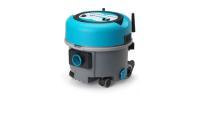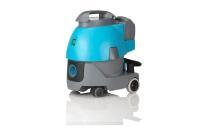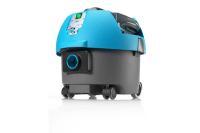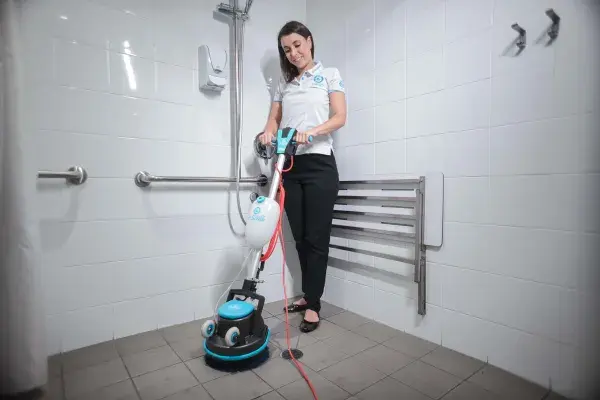You are reading: Cordless vs Electric Vacuum Cleaners: An Honest Comparison
09 March 2023
4min read time
Brooke Payne
Cordless vs Electric Vacuum Cleaners: An Honest Comparison
Share:

Key Insights
- One of the main benefits of the electric vacuum cleaner is that they tend to have stronger suction power than cordless vacuums, making them more effective at removing dirt and debris from carpets and upholstery.
- Cable electric vacuum are typically the most affordable, and the consistent power supply means that the motor can run at full power - without losing suction.
- Unlike cable vacuums, cordless vacuums run on a rechargeable battery and do not need to be plugged in to use, providing greater flexibility and portability.
When it comes to cleaning your home or workplace, there are many options available when deciding between vacuum cleaners. Two popular choices are cordless and cable electric vacuums. In this article, we’re going to compare the pros and cons for each to help you decide which one is the better option for you.
What are the Advantages of Cable Electric Vacuums?
First, let's look at electric cable vacuums. These are the traditional vacuums that have been around for decades. They plug into an outlet and use electricity to power the motor and suction.
One of the main benefits of the electric vacuum cleaner is that they tend to have stronger suction power than cordless vacuums, making them more effective at removing dirt and debris from carpets and upholstery. Cable electric vacuum are typically the most affordable, and the consistent power supply means that the motor can run at full power- without losing suction. As they are plugged into to a power source, they will not run out of power which makes them great for cleaning large areas in a short period of time.
As electric vacuums do not have any space reserved for batteries, they may have a larger dirt capacity, allowing you to vacuum a larger space before emptying.
Another advantage of electric vacuums is their weight, which is especially relevant to backpack vacuums. As they do not require batteries, they are lighter and easier to carry, making them more convenient to use, especially when cleaning hard-to-reach areas. This makes it easier to maneuver the vacuum and can help reduce the strain on your arms and back. If you're looking for lightweight electric vacuums in Australia or New Zealand, this could be an ideal choice for your cleaning needs.

What are the Disadvantages of a Cable Electric Vacuum?
While cable electric vacuums have their benefits, they also have several drawbacks. One of the main disadvantages is that they need to be connected to a power source, which isn't always available in every cleaning location, such as high up on a staircase or outside. This often means you will need to find a nearby power source or use an extension cord to reach the desired cleaning area. This can also increase the risk of tripping over the cord or causing an accident.
Additionally, using a cable vacuum can be more time-consuming due to the need to find a power source when moving from one area of the house to another. For example, if you are cleaning a large home with multiple rooms, you may need to change plug sockets several times during your daily cleaning routine. This not only takes up time, but it can also disrupt the cleaning flow. Over the course of a year, the time spent changing plug sockets can add up to several hours.
Overall, the need for a power source and the limitations of the cord can be a significant drawback for some users, especially those who need to clean large areas or those who prefer a more flexible cleaning experience.
What are the Advantages of a Cordless Vacuum?
What are the Advantages of a cordless vacuum? Battery-powered vacuums are a popular choice for many people, and for good reason. Unlike cable vacuums, cordless vacuums run on a rechargeable battery and do not need to be plugged in to use, providing greater flexibility and portability. This allows you to reach areas that are difficult to access around your home or office, making cleaning a breeze.
One of the key advantages of battery vacuums is their agility. Without a cord to restrict movement, you have the freedom to move around your home or office as needed, making it easier to clean under furniture, around corners, and in other tight spaces. This added agility also reduces the risk of tripping over a cord, as well as the risk of damaging furniture or other items around your home.
Another advantage of cordless vacuums is the reduced electrical safety risk from worn or damaged cables. With a cordless design, there is no need to worry about electrical safety issues that may arise from worn or damaged cables. This not only improves safety, but it also provides peace of mind for users.
Battery vacuums also offer time-saving benefits. By eliminating the need to change plug sockets as you move from one room to another, battery vacuums can be used more efficiently and effectively, reducing cleaning time and increasing productivity.
Overall, cordless vacuums offer a range of benefits that make them a popular choice for those looking for a more flexible and efficient cleaning experience.
Read more on how to clean carpet the encapsulation method.

What are the Disadvantages of a Cordless Vacuum?
There are some trade-offs to consider with battery-powered vacuums. For one, they can often have weaker suction power compared to electric vacuums. This can make them less effective at deep cleaning carpets and picking up larger debris. Additionally, the battery life of these vacuums can be limited, with some models only providing around 30 minutes of cleaning time on a single charge, or even as short as 7 minutes on high power on some models. This may not be enough for larger cleaning jobs or for people with a lot of floor space to cover. To avoid choosing the wrong type, make sure you choose a unit with a powerful motor and a high-voltage lithium-ion battery pack to provide healthy performance and impressive real-world runtimes.
A great example of a long lasting, cordless vacuum is the vac 9B which has a suction rate of 40-litres-per second, features a nine-litre capacity as well as a huge 80-minutes of runtime.
Another disadvantage of battery vacuums is their cost. They tend to be more expensive than cable vacuums, due to the advanced technology and rechargeable batteries used in their design. The initial investment in a high-quality battery vacuum may be higher, but the benefits in terms of portability, safety, and of use may make it a worthwhile investment in the long run. However, the cost of a battery vacuum may not be suitable for those with a tight budget.
What’s Better: A Cable Electric or Cordless Battery Vacuum?
Overall, the choice between a battery-powered or electric vacuum cleaner comes down to personal preference and the specific cleaning needs of your home or workplace. Battery vacuums are a great option for anyone looking for more modern, safer technology and superior agility when cleaning. On the other hand, if you have a lot of carpet and have a limited budget, a cable electric vacuum may be the better option.
i-team has a wide range of innovative vacuums available, including two cordless and three cable electric units, which you can learn more about here .
Explore commercial vacuum cleaning options – find the right balance of power and mobility for your facility.
People Also Ask: FAQ's
What is better, cordless or corded vacuum cleaner?
Cordless vacuums are lightweight and flexible, making them ideal for quick cleanups and versatile enough to handle different surfaces. In contrast, corded vacuums often provide more consistent suction power, making them better suited for deep cleaning. The best choice depends on your specific needs and preferences.
What are the disadvantages of a cordless vacuum?
Here are some drawbacks of cordless vacuum cleaners:
- Limited battery life: One of the most noticeable disadvantages is when the vacuum stops working due to a depleted battery.
- Reduced suction power: Cordless vacuums may have less suction compared to their corded counterparts.
- Higher cost: These models tend to be more expensive.
- Weight: Some cordless vacuums can be heavy, making them less convenient to use.
- Environmental impact: The batteries used in these vacuums can have a negative impact on the environment.
- Maintenance and replacement costs: Keeping a cordless vacuum in good condition can involve higher maintenance and replacement expenses.
Do cordless vacuum cleaners use more electricity?
Cordless vacuum cleaners consume energy only while charging and typically use less energy than corded models. However, they tend to be less powerful as a trade-off.
Is it OK to leave a cordless vacuum plugged in all the time?
It’s designed for you to keep it on its dock between uses, ensuring it’s always fully charged and ready to grab whenever you need to clean
References
https://crewcare.co.nz/blog/battery-powered-vs-corded-vacuum-cleaner/
Media and Insights
Join the movement that's changing what clean means.
Be part of a cleaner world. Get a live demo at a time that suits you.
Book a Demo











